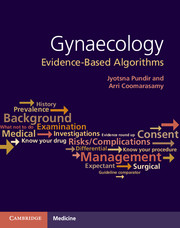Book contents
- Frontmatter
- Dedication
- Epigraph
- Contents
- Preface
- List of Abbreviations
- SECTION 1 Early pregnancy care
- SECTION 2 Disorders of menstruation
- SECTION 3 Reproductive medicine
- SECTION 4 Subfertility
- SECTION 5 Urogynaecology, pelvic floor problems, and hormone replacement therapy
- SECTION 6 Gynaecological oncology
- SECTION 7 Sexual and reproductive health, sexually transmitted infection, and vaginal infection
- SECTION 8 Contraception
- Index
Preface
Published online by Cambridge University Press: 05 April 2016
- Frontmatter
- Dedication
- Epigraph
- Contents
- Preface
- List of Abbreviations
- SECTION 1 Early pregnancy care
- SECTION 2 Disorders of menstruation
- SECTION 3 Reproductive medicine
- SECTION 4 Subfertility
- SECTION 5 Urogynaecology, pelvic floor problems, and hormone replacement therapy
- SECTION 6 Gynaecological oncology
- SECTION 7 Sexual and reproductive health, sexually transmitted infection, and vaginal infection
- SECTION 8 Contraception
- Index
Summary
Evidence-based medicine is the conscientious, explicit, and judicious use of current best evidence in making decisions about the care of individual patients. With the evolution of evidence-based medicine, and the explosion of medical literature, there has been a continuous stream of guidelines published in obstetrics and gynaecology. These guidelines, designed to provide systematically developed recommendations, assist clinicians and patients in making decisions about appropriate treatment for specific conditions. They also provide crucial information for candidates preparing for the Member of the Royal College of Obstetricians and Gynaecologists (MRCOG) examination. Our attempt is to bring together the essential information contained in these guidelines in these comprehensive books. Where guidelines do not exist, we have relied on available evidence and accepted norms of practice. The information is presented in flowcharts, representing a step-by-step method of solving a clinical problem.
As our books are a revision guide for MRCOG candidates, we have focused primarily on RCOG and other UK national guidelines. However, many chapters contain a ‘Guideline Comparator’ box carrying information from other important international guidelines, thus providing an international perspective. Several chapters also contain a ‘what not to do’ box, which should act as a source of rich debate! Our desire is that these books act as an essential tool for clinicians and examination candidates. However, they should not replace a close study of the guidelines themselves.
- Type
- Chapter
- Information
- Gynaecology: Evidence-Based Algorithms , pp. ix - xPublisher: Cambridge University PressPrint publication year: 2016



